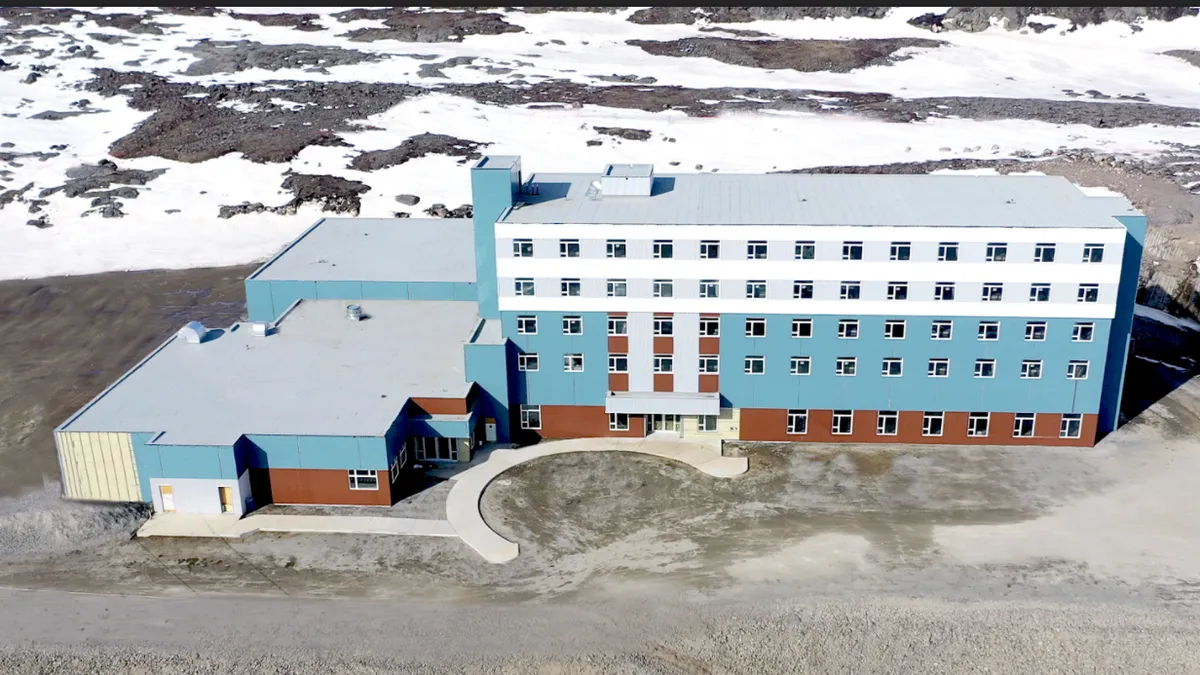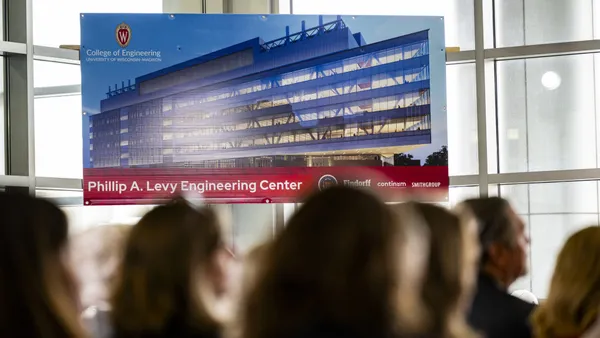The Modular Building Institute recently presented awards to North American projects that demonstrated distinctive achievements in offsite construction, including everything from small retail locations and restroom pods to massive offices, schools, hospitals and hotels. The projects honored companies that found unique ways to incorporate the use of offsite construction to cut project timelines and enhance efficiency.
Here are some of the notable honorees from across the Modular Building Institute's various categories in 2021:
Coburn Crossing Apartments
Coburn Crossing Apartments consist of five three-level buildings providing 139 units across 116,586 square feet of workforce housing in Truckee, California, near Lake Tahoe and several prominent ski resorts.
Nashua Builders produced two of the buildings which housed 54 modules and 47 apartment units. Inside, the buildings consist of studio, one-bedroom and two-bedroom dwellings. The exterior is fiber cement and metal siding with vinyl windows. Mansard roofs were added on site, because they couldn't be built in the factory due to height restrictions.
Allegiant Stadium Ticket Office
The unique, modern design of Allegiant Stadium, home to the NFL's Las Vegas Raiders, required an alternative to a stick-built ticket office. The $1.8 billion Mortenson-McCarthy joint venture enlisted Xtreme Cubes to construct the ticket office off site as the stadium was built on site.
Xtreme constructed steel moment frame cubes for the project, allowing them to be moved directly from delivery trucks using only a telehandler. The main ticket booth is nearly 2,500 square feet and serves as the entryway to the stadium.
Good Samaritan Pediatric Emergency Room Addition
Axis Construction Corp. teamed with Modlogiq on the construction of Good Samaritan hospital's new pediatric emergency room in West Islip, New York. The 8,600-square-foot project took 199 days to complete and includes 12 private treatment bays, two of which are also isolation rooms.
The facility was built in the factory to ensure precision fit and the function of all features and systems — including all medical gases and pneumatic prescription delivery systems — which resulted in a shorter site installation time, reduced onsite activity and disruption to the community, according to the project team. Once finished, it was deconstructed and transported to the site.
VIP Village Pre-School
VIP Village Pre-School, constructed by Silver Creek Industries in Imperial Beach, California, includes seven buildings ranging in size from 2,560 to 6,480 square feet. The project — which took 212 days to complete — includes:
- Five classroom buildings with 21 classrooms, restrooms and two staff workrooms.
- An administrative building that contains six private offices, a conference room, a lobby, a nurse's office, staff restroom facilities and various support spaces.
- A multipurpose building with a large multi-use assembly and lunch room, a kitchen, a staff lounge and restroom facilities.
The school, which totals 30,160 feet, used a project-specific modular design, with module width varying from 10 to 12 feet and lengths from 32 to 60 feet. The multipurpose building used open web trusses for the roof frame system and a lightweight concrete floor system which was poured in the factory.
City of Hope Building Project
Pacific Mobile Structures, in affiliation with Phoenix Modular, constructed the City of Hope Building Project, a 16,480-square-foot office space in Duarte, California. Pacific Mobile provided five modular buildings to the City of Hope, including team-oriented space and restroom buildings that provided the facilities they needed for multiple parties to work on the expansion of the City of Hope Hospital.
All five buildings were designed, constructed and installed in 62 days — though the Modular Building Institute listed the total project time as 182 days — and strategically placed in a triangular arrangement to allow for convenient access and movement between each building from the nearby parking lot. The modular office administration buildings were designed to be repurposed with the option to be divided into 10 buildings after their initial use.
Harvest Marjiuana Dispensary
Modlogiq constructed a 2,472-square-foot retail facility for Harvest House of Cannabis — a business that was racing to open the first medical marijuana dispensary in Little Rock, Arkansas. One of the biggest design challenges was not only converting the company's brand to modular and tackling unique dispensary construction requirements, but also slashing half a year off the project schedule.
Modlogiq and its design partner AEdifica added bulletproof glass to separate the entry lobby from the showroom. The project, which is composed of six modules and opened six months before it would have been delivered with conventional construction, according to the project team, took 197 days to complete.
Aqsarniit Hotel and Conference Centre
Stack Modular and BIRD Construction built the 89,900-square-foot Aqsarniit Hotel and Conference Centre in Iqaluit, Canada, in 825 days. Modules had to be delivered by boat, which was a challenge, as there was no nearby dock for offloading. The delivery vessel had to be deep water anchored while the modules were craned to a barge, tugged to shore then brought to site at high tide. The creative, turn-key fashion of delivering units reduced construction time on site by over a year, according to the project team. The final building's design includes a structural steel podium conference center, lounge, restaurant, commercial kitchen and staff facilities.
The four stories above the hotel's traditional base feature modular hotel units including double queen rooms, king rooms and suites comprised of a spacious residential style kitchen, sitting area, dedicated bedroom and washroom. Elevator, mechanical and electrical shafts as well as stairwells and electrical rooms were all incorporated into the modular design. All fixtures, furniture and equipment were fully installed in each modular unit and delivered to site.













